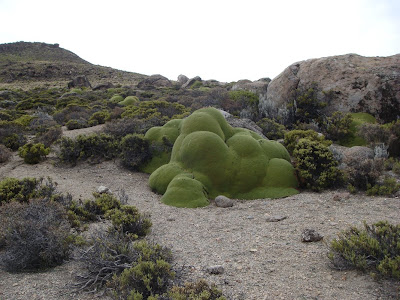|
|
Saturday, September 26th, 2009
This is a funny bit of information: The island where José Saramago lives (and about which he has published a series of journals) is Lanzarote, in the Canaries. I had never realized what this name is until I was reading along in Don Quixote just now: ...puesto que no quisiera descubrirme fasta que las fazañas fechas en vuestro servicio y pro me descubrieran, la fuerza de acomodar al propósito presente este romance viejo de Lanzarote......given that I had not wanted to declare myself until the deeds I had performed in your service made me known, the necessity of adapting to the present circumstances that old romance of Lancelot... I'm giggling now thinking about Saramago living on an island named after Sir Lancelot. Probably just me...
posted afternoon of September 26th, 2009: Respond
➳ More posts about José Saramago
|  |
|
Another utterly spectacular production from Blu -- this one is in collaboration with David Ellis. I linked to a previous video of theirs last year; I see from their website that they also did a short piece in Gdansk playing with ideologies...
posted morning of September 26th, 2009: Respond
➳ More posts about Pretty Pictures
|  |
Friday, September 25th, 2009
Y asÃ, sin dar parte a persona alguna de su intención, y sin que nadie le viese, una mañana, antes del dÃa, que era uno de los calurosos del mes de julio,... salÃo al campo con grandÃsima  contento y alborozo de ver con cuanta facilidad habÃa dado principio a su gran buen deseo. contento y alborozo de ver con cuanta facilidad habÃa dado principio a su gran buen deseo.
I've understood vaguely all along that Cervantes is considered a major root of the tree which is Spanish-language literature but never quite gotten it from the translations I've read. But looking at the original as I've been doing over the last couple of days I am starting to understand what a master of language he is -- even though I am only half- or three-quarters-understanding it the force of his voice is pulling me in and along.
 Update: Oh and cool, look at this article I just found with some history as regards Picasso's image of the man of La Mancha.
posted evening of September 25th, 2009: 3 responses
➳ More posts about Don Quixote
|  |
|
I hope a movie has been made of Unamuno's El marqués de LumbrÃa; this opening paragraph would be spectacular on the screen: La casona solariega de los marqueses de LumbrÃa, el palacio, que es como se le llama en la adusta ciudad de Lorenza, parecÃa un arca de silenciosos recuerdos del misterio. A pesar de hallarse habitada, casi siempre permanecÃa con las ventanas y los balcones que daban al mundo cerrados. Su fachada, en la que destacaba el gran escudo de armas del linaje de LumbrÃa, daba al MediodÃa, a la gran plaza de la Catedral, y frente a la ponderosa fábrica de ésta, pero como el sol bañaba casi todo el dÃa, y en Lorenza apenas hay dÃas nublados, todos sus huecos permanecÃan cerrados. Y ello porque el exelentÃsimo señor marqués de LumbrÃa, Don Rodrigo Suárez de Tejada, tenÃa horror a la luz del sol y al aire libre. "El polvo de la calle y la luz del sol-solÃa decir-no hacen más que deslustrar los muebles y hechar a perder las habitaciones, y luego, las moscas..." El marqués tenÃa verdadero horror a las moscas, que podÃan venir de un andrajoso mendigo, acaso de un tiñoso. El marqués temblaba ante posibles contagios de enfermedades plebeyas. Eran tan sucios los de Lorenza y su comarca...
The ancestral mansion of the Marquéses of LumbrÃa, the palace as it was called in the gloomy city of Lorenza, appeared as a chest of silent memories of the mysterious. In spite of its being in fact occupied, the windows and balconies which gave out onto the world were almost always closed. The façade, where the great coat of arms of the LumbrÃan lineage stood forth, looked south*, onto the great square of the Cathedral, whose ponderous construction it faced, but as the sun was shining all day long, and in Lorenza there are hardly any cloudy days, all of its openings remained closed. And this was because the excellent Señor Marqués of LumbrÃa, don Rodrigo Suáres de Tejada, abhorred the light of the sun and fresh air. "The dust of the street and the light of the sun -- he used to say -- do no more than dull the furniture's shine and spoil the rooms; not to mention the flies..." The Marqués was deathly afraid of flies, which might have come from a ragged, miserable beggar. The Marqués trembled at the thought of catching plebian diseases. And they were so filthy, the Lorenzans and the countryfolk...
 ...But it looks like no; several of his stories and books have been filmed but not this. *How great a dialect for "south" is "noon"? A lovely one.
posted evening of September 25th, 2009: Respond
➳ More posts about Cuentos Españoles/Spanish Stories
|  |
Thursday, September 24th, 2009
Christine K. passed along a link to Rachel Sussman's hunt for the Oldest Living Things in the World -- fun reading and some great photography. I was particularly taken with Sussman's photo of the llareta, an Andean plant which grows over rocks kind of like moss and forms some delightful shapes as it ages through the millenia.  Currently Sussman is on a pilgrimage to see a 9,500-year-old Spruce tree that is growing in Sweden.
posted evening of September 24th, 2009: 1 response
|  |
Sunday, September 20th, 2009
Next story in Cuentos Españoles after La fuerza de la sangre (skipping over several centuries -- did nothing happen in Spain between the early 1600's and the late 1800's?) is El libro talonario by Pedro Antonio de Alarcón. A good solid story, a narrative voice I can relate to. And I find that a couple of years ago, it was made into a short movie! The movie is well done -- it gets across the idea of the story without adhering slavishly to its plot, and brings a modern perspective to it. Take a look, it's a pleasant 20 minutes:
posted evening of September 20th, 2009: Respond
➳ More posts about Readings
|  |
|
I've been reading some stories from Angel Flores' Spanish Stories/Cuentos Españoles, a facing-pages bilingual edition of Spanish short stories from Don Juan Manuel to Goytisolo. It's kind of a tricky book to recommend other than to someone learning Spanish -- for which purpose it is extremely useful -- because the translations are close to literal, rather than literary. They serve their purpose very well, of allowing me to cross-reference when I do not understand a bit of the Spanish; but if I were just reading the English I think I would look for a more polished translation. Anyways, I am loving the book and I recommend it if you find yourself in a similar position to me, interested in acquainting yourself with the literature and language of Spain. I'm a bit surprised by how well I can understand the old Spanish of Lazarillo de Tormes -- I am not worrying too much about recognizing verb tenses, generally it is just enough to recognize that a word is some form of a particular verb, and I can get the rest from context. The text uses a whole lot of subjunctive preterites and second-person plurals which I'm pretty unfamiliar with... Lazarillo de Tormes (you can read a bilingual edition of it here, by a translator who apparently wishes to remain nameless) is according to Flores (and confirmed by Wikipædia), the first instance of Picaresque literature. Neat! I'm not real well acquainted with this genre beyond Don Quixote and The Adventures of a Simpleton... Lazarillo is fun and entertaining but did not really draw me in, I think the narrative voice just sounds too stilted for me to really get into it -- by way of comparison the first few pages of Cervantes' La fuerza de la sangre (one of his Novelas exemplares, which you can read here) have me falling in love with his clear voice -- I have only read him in translation before, I think when I am a little better at reading Spanish I need to try Don Quixote in the original, or in a bilingual edition if such a thing exists.* Cervantes was writing only a few decades later than the author of Lazarillo so I definitely think the stilted quality of the latter is a product of the author rather than of his age
 *A bilingual e-book of Part I of Don Quixote is available for free download from Fusion Bilingual eBooks. Also there is an abridged bilingual edition from Anglo-Didacto which comes with a CD of readings; my first impulse is to be skeptical of the claim that the updating of archaic forms has been "done with profound respect to the Spanish text as well as its translation in English, [and] only emphasises, more if possible, the magic of Cervantes' pen."
posted afternoon of September 20th, 2009: Respond
➳ More posts about Miguel de Cervantes
|  |
Friday, September 18th, 2009
So for a while I've been wondering about the obituary of Poe that Borges attributes to Whitman in his lecture on The Detective Story... Today I tracked it down. (Thanks for their invaluable assistance to Brett Barney and Ed Folsom of the Whitman Archive.) Borges is referring to Whitman's essay A Backward Glance O'er Travel'd Roads, in which he says of Poe's poems that "beyond their limited range of melody (like perpetual chimes of music bells, ringing from lower b flat up to g) they were melodious expressions, and perhaps never excell'd ones, of certain pronounc'd phases of human morbidity." Also worth looking at Whitman's note on Edgar Poe's Significance -- Whitman's take on Poe seems to have been very much in line with Borges' own.
posted evening of September 18th, 2009: Respond
➳ More posts about Borges oral
|  |
|
שנה טובה! Today is also the start of a new year for Sylvia; she is turning 9. Lots of fun this weekend, what with going to Ellen's family for Rosh Hashanah tomorrow, and taking Sylvia's friends to the bowling alley for a birthday party on Sunday. (This is a party choice of Sylvia's that I am totally on board with!) I hope your weekend is a good one too, and your coming year likewise.
posted afternoon of September 18th, 2009: 1 response
➳ More posts about Sylvia
|  |
Sunday, September 13th, 2009
Bearing in from either Limb of Sight,
A-thrum, like peevish Dumbledores in flight
Timothy Tox, The Pennsylvaniad Could Pynchon have put a Harry Potter reference into Mason & Dixon? I don't even know if that's possible chronologically... Both books were published in 1997, so it seems unlikely, though I don't know the months... Aha! The name is according to Wikpædia an early Modern English word for "Bumblebee".
 Update: Looks like somebody else noticed this and asked the same question a while back... Mildly amusing synonym for "dumbledore" is "cockchafer".
posted evening of September 13th, 2009: Respond
➳ More posts about Mason & Dixon
| Previous posts
Archives  | |
|
Drop me a line! or, sign my Guestbook.
•
Check out Ellen's writing at Patch.com.
| |

